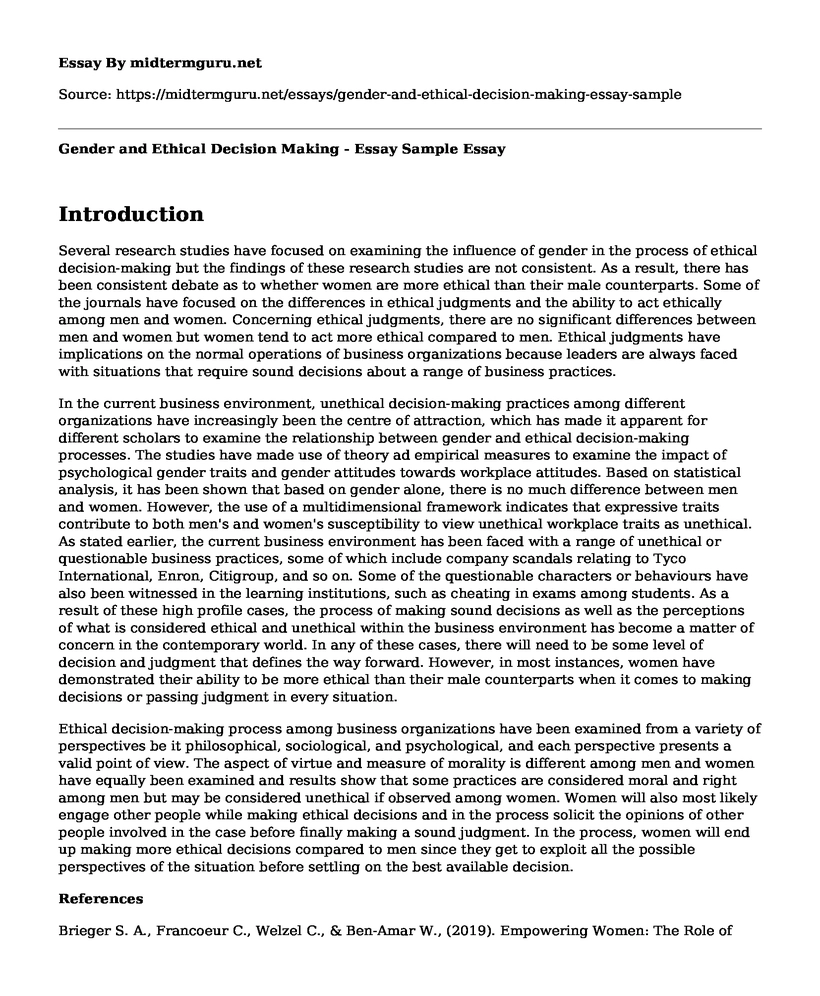Introduction
Several research studies have focused on examining the influence of gender in the process of ethical decision-making but the findings of these research studies are not consistent. As a result, there has been consistent debate as to whether women are more ethical than their male counterparts. Some of the journals have focused on the differences in ethical judgments and the ability to act ethically among men and women. Concerning ethical judgments, there are no significant differences between men and women but women tend to act more ethical compared to men. Ethical judgments have implications on the normal operations of business organizations because leaders are always faced with situations that require sound decisions about a range of business practices.
In the current business environment, unethical decision-making practices among different organizations have increasingly been the centre of attraction, which has made it apparent for different scholars to examine the relationship between gender and ethical decision-making processes. The studies have made use of theory ad empirical measures to examine the impact of psychological gender traits and gender attitudes towards workplace attitudes. Based on statistical analysis, it has been shown that based on gender alone, there is no much difference between men and women. However, the use of a multidimensional framework indicates that expressive traits contribute to both men's and women's susceptibility to view unethical workplace traits as unethical. As stated earlier, the current business environment has been faced with a range of unethical or questionable business practices, some of which include company scandals relating to Tyco International, Enron, Citigroup, and so on. Some of the questionable characters or behaviours have also been witnessed in the learning institutions, such as cheating in exams among students. As a result of these high profile cases, the process of making sound decisions as well as the perceptions of what is considered ethical and unethical within the business environment has become a matter of concern in the contemporary world. In any of these cases, there will need to be some level of decision and judgment that defines the way forward. However, in most instances, women have demonstrated their ability to be more ethical than their male counterparts when it comes to making decisions or passing judgment in every situation.
Ethical decision-making process among business organizations have been examined from a variety of perspectives be it philosophical, sociological, and psychological, and each perspective presents a valid point of view. The aspect of virtue and measure of morality is different among men and women have equally been examined and results show that some practices are considered moral and right among men but may be considered unethical if observed among women. Women will also most likely engage other people while making ethical decisions and in the process solicit the opinions of other people involved in the case before finally making a sound judgment. In the process, women will end up making more ethical decisions compared to men since they get to exploit all the possible perspectives of the situation before settling on the best available decision.
References
Brieger S. A., Francoeur C., Welzel C., & Ben-Amar W., (2019). Empowering Women: The Role of Emancipative Forces in Board Gender Diversity, Journal of Business Ethics, 155, 495-511, DOI 10.1007/s10551-017-3489-3
McCabe A. C., Ingram R., & Dato-on M. C., (2006). The Business of Ethics and Gender, Journal of Business Ethics, 64: 101-116, DOI 10.1007/s10551-005-3327-x
Muhammad, N., Scrimgeour, F., Krishna, R., & Sazali, A. (2014). The Impact of Corporate Environmental Performance on Market Risk: The Australian Industry Case, Journal of Business Ethics, DOI: 10.1007/s10551-014-2324-3
Valentine S. R., & Rittenburg T. L., (2007). The Ethical Decision Making of Men and Women Executives in International Business Situations, Journal of Business Ethics, 71, 125-134, DOI 10.1007/s10551-006-9129-y
Wang L. C., & Calvano L., (2015). Is Business Ethics Education Effective? An Analysis of Gender, Personal Ethical Perspectives, and Moral Judgment, Journal of Business Ethics, 126 (4), 591-602, DOI 10.1007/sl0551-013-1973-y.
Wei H., & Ran Y., (2019). Male Versus Female: How the Gender of Apologizers Influences Consumer Forgiveness, Journal of Business Ethics, 154, 371-387, https://doi.org/10.1007/s10551-017-3440-7
Cite this page
Gender and Ethical Decision Making - Essay Sample. (2023, Jan 31). Retrieved from https://midtermguru.com/essays/gender-and-ethical-decision-making-essay-sample
If you are the original author of this essay and no longer wish to have it published on the midtermguru.com website, please click below to request its removal:
- Essay on Employee Motivation in Nursing
- Background and Rise of the Eastman Kodak Company - Paper Example
- Johnson & Johnson Company SWOT and Target Market Analysis - Research Paper
- Paper Example on America's Social Classes: Unnecessary Evil
- Social Media's Impact On Society - Research Paper
- Patty McCord's Freedom and Responsibility at Netflix - Essay Sample
- Leading Differently: Confucius' Checklist for Authority Figures - Essay Sample







